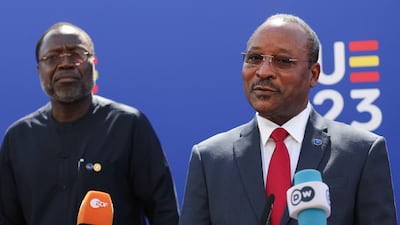The EU is “in favour of a diplomatic solution” in Niger following a military coup last month and the continued house arrest of the country's democratically elected leader, the bloc's top diplomat Josep Borrell said on Thursday.
“It stands to reason that nobody wants a military intervention,” Mr Borrell told reporters during a joint press conference following a meeting of the bloc's 27 foreign affairs ministers in Spain.
The EU has repeatedly said that it would support decisions made by the Economic Community of West African States following the coup, but exactly what this might entail remains elusive.
Mr Borrell had previously said that Brussels was walking in Ecowas's footsteps and preparing a sanctions framework against the coup plotters.
Yet the Spanish diplomat shied away from clarifying whether the bloc would also support Ecowas should it move ahead with its threat of a military intervention.
“We want to make it abundantly clear that we are not going to allow the coup perpetrators to remain in Niger,” said Mr Borrell.
“We have provided Ecowas our full support, but of course we want to know exactly what they are planning to do.
“We are open to considering specific, fleshed out proposals from Ecowas. We will have to assess them.”
He made his remarks shortly after he and European foreign affairs ministers held an in-person meeting with Ecowas President Omar Touray, the alliance's commissioner for peace and security Abdel-Fatau Musah, and Niger's foreign affairs minister in exile Hassoumi Massaoudou.
“They explained the situation on the ground and how they, Ecowas, would envisage military deployment on the ground,” said Mr Borrell, without giving further details on those plans.
UN agencies, NGOs and international organisations were being stopped from working in military “operation zones”, Niger's Interior Ministry said on Thursday.
“Due to the current security situation and operational commitment of the Nigerien armed forces, the ministry informs international organisations, national and international NGOs and UN agencies present in Niger that all activities and or movements in the zones of operations are temporarily suspended,” a statement broadcast on national radio said.
Ecowas wants the EU's support so that it can remain strong, Mr Massaoudou told reporters.
“Decisions taken by Ecowas heads of state must be backed by all our partners, starting with the EU,” he said.
European foreign affairs ministers showed little enthusiasm for supporting a military intervention, which has become less likely as international support for the idea wanes and observers warn of risks of a wider regional conflict.
Italy's Foreign Affairs Minister Antonio Tajani spoke positively of an Algerian proposal made this week to resolve the crisis.
Algeria, which shares a 1,000-kilometre land border with Niger, suggested a six-month to three-year transitional plan overseen by an unspecified civilian power.
Mr Tajani said that a military intervention in Niger would be a “disaster” that could trigger a new migration crisis.
“We need to work day by day for a diplomatic solution,” he said.
European politicians also expressed concern for a more recent military coup in Gabon, but said that the situation was not comparable to the crisis in Niger.
Gabon is not part of Ecowas, which currently has 11 active members.
“President Bazoum was the only democratically elected president in the Sahel,” said Mr Borrell.
“The elections in Gabon well – we have our doubts on their validity.”
The military intervened on Wednesday after veteran leader Ali Bongo claimed victory in a presidential election, naming the head of the Republican Guard, Gen Brice Oligui Nguema, “transitional president” in his place.
Mr Borrell expressed sympathy for President Mohamed Bazoum, who is currently being held hostage by his own guard “without electricity in terrible heat and sometimes without water”.
He also expressed support for the “difficult position” of France's ambassador to Niamey, Sylvain Itte.
The country's new military rulers on Thursday stripped Mr Itte of his immunity and asked police to expel him.
France has about 1,500 troops in Niger, many of them stationed at an airbase near the capital. They were sent to the region to help the country fight a bloody insurgency by armed extremists.
An organisation set up after the coup, the Patriotic Front for Niger Sovereignty, has led public demands for the coup leaders to take a hard line on France.
It has lashed Mr Itte for being a “French citizen in an irregular situation” on Niger's soil and has also called for a “massive” march next Saturday on the French base, followed by a sit-in until the troops leave.
The military takeovers in Niger and Gabon come after similar coups in recent years in Mali, Burkina Faso and Guinea.
These events must trigger a rethink of the EU's policies in the region as insurgent groups become more powerful, according to Mr Borrell, who said that 80 per cent of Burkina Faso's territory is outside government control.
“We need to find a way of revisiting our Sahel policy,” he said.


